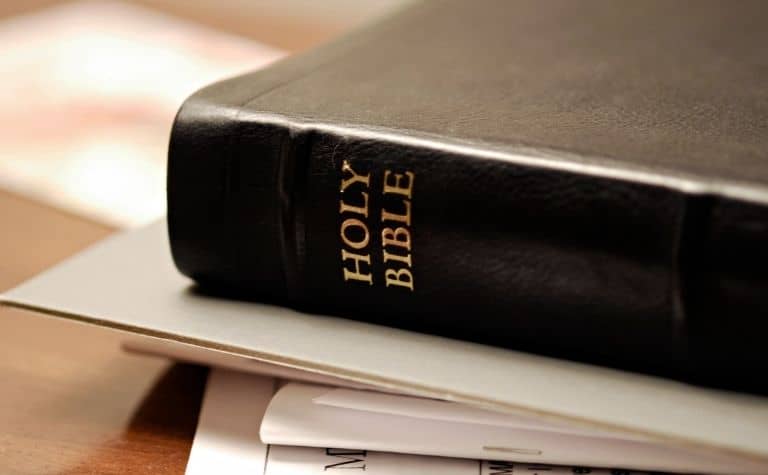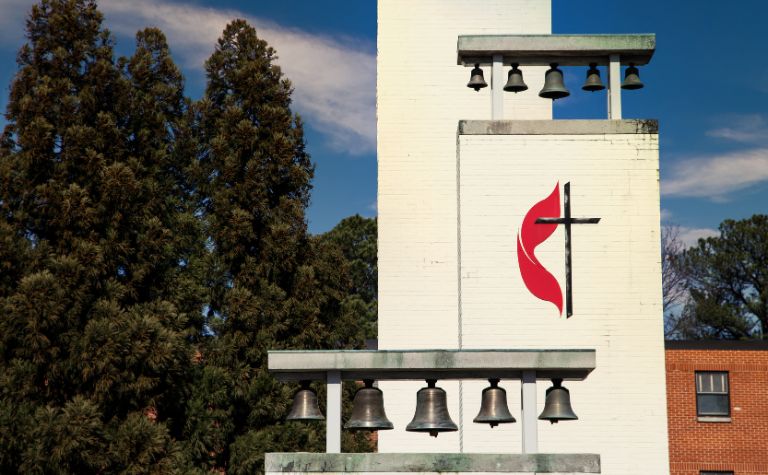Methodists have always been intentional about the way they approach their Christian faith. In addition, the Bible is their primary guide for doctrine and practice. These two facts make many people curious about what Bible translation the Methodist church uses.
The most common Bible translations that Methodists read are the New Revised Standard Version (NRSV) and the Common English Bible (CEB). The NRSV is more scholarly, and the CEB is more accessible to average readers. The KJV and NIV are also popular. Leaders don’t require members to read a certain translation.
Do some Methodist churches still use the King James Version? Why do some people have problems with it? Do Methodists take biblical passages, such as the creation account, literally? Keep reading to learn more.

Do Methodists Use the King James Version?
Because Methodist denominations don’t mandate the use of a particular translation of the Bible, some congregations in the tradition use the KJV in their services or as a pew Bible.
In addition, many Methodists often use a translation they can understand for personal study or morning devotions. For some, this is the KJV. (Also see Methodist vs. Baptist: What’s the Difference?)
Some people believe the KJV is the best translation to read out loud, such as in a church service. They attribute it to the poetic beauty of the translation, which contrasts with the simplicity of language in many modern translations like the NRSV and the CEB. Many readers of the KJV translation consider it a work of art.
The KJV translation also has its detractors among Methodists who offer criticisms like,
- The KJV can be off-putting to the modern reader, especially those outside the church who aren’t used to studying the Bible. If someone already assumes that Christianity is not relevant to the modern world, then the KJV may give that person one more reason to continue with that assumption. In addition, the English language has evolved, and, in some cases, English words have changed meanings entirely.
- Biblical scholarship has significantly progressed since James VI (1566-1625), i.e., “King James.” In particular, historians have unearthed older and more accurate copies of the original Greek and Hebrew manuscripts. Also, translators have learned how to understand better and translate these ancient languages. [1]
The United Methodist Church, the largest Methodist denomination in the United States, uses the NRSV and the CEB in its published materials.
- NRSV: The NRSV is popular in academic circles and the mainline denominations in the United States. It attempts to be readable and accurately represent the original languages without denominational bias. Because of this, the NRSV has received support from both Catholics and Protestants.
- CEB: The CEB is a relatively new translation that scholars completed in 2011. The goal of the translators was to achieve a translation that over half of the readers of the English language could understand. The translation is a mix of both dynamic and formal equivalence. It reads at a 7th-grade reading level; for reference, this is the same level as the USA Today newspaper. [2]

Do Methodists Read the Bible Literally?
Historically, the Methodist tradition has encouraged a literal interpretation of the Bible. The approach to the Bible led Wesley and his followers to adopt beliefs such as,
- They believe that Jesus lived a sinless life on earth, died on the cross, and rose bodily from the dead.
- They believe that miracles in the Bible actually happened and didn’t merely express truth figuratively.
- They believe in heaven, hell, and a future resurrection (See the full article Do Methodists Believe In Heaven?)
- They believe that God is real and communicates with people.
These are all claims the Bible makes, and orthodox Methodists have always taken them at face value. However, in recent decades, especially in the Western world, many Methodist denominations and churches have questioned the historical teachings of the church when they conflict with modern social trends and values.
Genre: Methodists have historically recognized that the Bible includes a variety of literary genres, not all of which readers should interpret literally. The Bible contains history, poetry, law, gospels, letters, and even an apocalypse. Within these genres are included both literal and symbolic meanings. (Also see Do Methodists Believe in Predestination?)
The question becomes not whether a person takes the Bible literally but whether a person interprets a biblical passage according to the rules of that genre.
There are different expectations when reading a Psalm than when reading one of the Gospels. However, Christians disagree about categorizing specific passages of Scripture into various genres. Here are two examples,
- Creationism: One disputed passage is the creation account at the beginning of the book of Genesis. Should Christians interpret the days of creation as literal, consecutive, 24-hour days, or should they interpret them poetically? There is a diversity of opinion on this particular doctrine among Methodists. However, on the whole, Methodists interpret the creation account in Genesis from a poetic framework.
- Homosexuality: The issue of homosexuality is another topic that reveals much about a person’s interpretive lens. The United Methodist Church still takes the Bible’s warnings concerning homosexuality at face value. However, many Methodists believe theologians have not properly understood this issue within its cultural context. Because of this difference of opinion, the UMC may split into two parts soon.

What Do Methodists Believe About the Bible?
The Methodist church believes that the Bible is the church’s primary source for doctrine and practice. God revealed himself through the life, death, and resurrection of Jesus.
The Bible bears witness to this self-revelation. The Bible also contains all that is necessary for salvation. (Also see What Do Methodists Believe About Heaven?)
Like other Christians, Methodists believe that the interpretation of the Bible should move past the individual study of single verses and instead into the grand, sweeping narrative of the entire Bible.
Also, each biblical book’s cultural and historical context is critical to interpreting Scripture rightly. (Also see Do Methodists Believe in the Saints?)
Methodists believe that the Bible is inspired in three critical ways.
- First, the Holy Spirit inspired the writers of the Bible to write the truth.
- Second, God guided the early Christians and various church councils in the canonization process. Methodists believe there are 39 books in the Old Testament and 27 in the New Testament. Most churches within Protestantism recognize the same 66 books as Scripture.
- Third, the Holy Spirit guides individual believers in their reading of the Bible.
Methodists believe that Christians should interpret the Bible using three different lenses. These three lenses are tradition, experience, and reason, all of which exist alongside using Scripture to interpret the Bible.
Additionally, Methodists believe that tradition, experience, and reason should instruct Christians on thinking and living. People should use the entirety of their beings to live the Christian life rightly. (Also see Do Methodists Wear Crosses?)
References:
[1] Source
[2] Source
[3] Source
Related Questions
The Methodist Church and the Roman Catholic Church both value doctrine and practice. Both traditions also believe they faithfully follow the teachings of Jesus of Nazareth, and they agree on...
The Methodist and Baptist branches of Protestant Christianity have left indelible marks on the Western world. Not only have the traditions planted churches, but they have positively contributed to...
